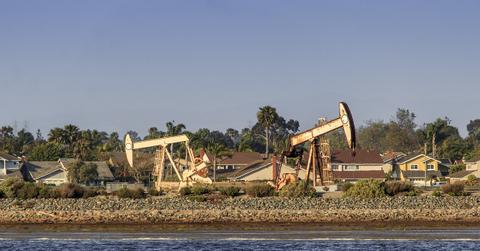New Zealand Just Announced They Will No Longer Issue Oil Exploration Permits
Prime Minister Jacinda Ardern announces that New Zealand will no longer be issuing oil exploration permits in their territory. The move comes after a decrease in oil production and push back from activist groups concerned about climate change.
Updated Nov. 19 2020, 9:39 p.m. ET
New Zealand is the latest country to ban future offshore oil and gas exploration in their area. Prime Minister Jacinda Ardern said on Thursday that climate change was a major impact in the decision. The move has a rippling effect on the fossil fuel industry and is met with criticism, but it shows how much opposition has increased over the years.
These actions come after Ardern accepted a Greenpeace petition to end oil and gas exploration with 50,000 signatures. The country’s 22 exploration permits that are currently active will not be affected after the announcement. Companies holding these permits are able to continue drilling under their expiration, with some going into 2030.
“By ending new oil and gas exploration in our waters, the fourth-largest exclusive economic zone on the planet is out of bounds for new fossil fuel exploitation,” Greenpeace New Zealand’s executive director, Russel Norman, said on their website. “New Zealand has stood up to one of the most powerful industries in the world.”
Another part of the move comes in the lack of oil exploration permits being handed out in recent years. New Zealand only issued one permit last year when they gave out as many as 10 four years ago. Crude oil production fell to its lowest amount back in 2016, the most in a decade, and falling oil prices have been the reason for the vast decline.
“When it comes to climate change, our plan is clear,” Ardern said according to The New York Times. “We are committed to the goal of becoming a net zero emissions economy by 2050.” The government is currently led by the Labor Party, who made tackling this issue one of its bigger priorities. They want to transition to 100 percent renewable energy by 2035.
Plenty of critics have spoken out against the New Zealand government’s announcement. The Petroleum Exploration and Production Association of the country didn’t like their approach to the move, saying that they didn’t consult the industry first. New Zealand Oil and Gas, one of their main energy companies, was not expecting the announcement to come through.
The National Party, the Labor Party’s opposition, believes it’ll have a negative effect on New Zealand. Their energy and resources spokesman, Jonathan Young, argues that this move won’t reduce emissions and “will simply shift production elsewhere.” He added that it’s “the demise of an industry that provides over 8,000 high-paying jobs and $2.5 billion for the economy.”
However, strong opposition for further oil exploration for many years now has created a shift in New Zealand. The government argues that jobs won’t be lost and they’ll be fully working with those holding permits. According to Greenpeace, they become one of the first countries to ban oil exploration. France announced last December that they would ban all fracking and oil extraction by 2040.
